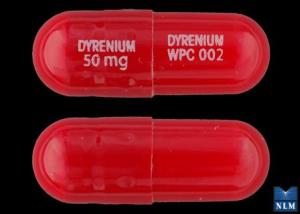Dyrenium Dosage
Generic name: TRIAMTERENE 50mg
Dosage form: capsule
Drug class: Potassium-sparing diuretics
Medically reviewed by Drugs.com. Last updated on Dec 5, 2024.
Adult Dosage
Dosage should be titrated to the needs of the individual patient. When used alone, the usual starting dose is 100 mg twice daily after meals. When combined with another diuretic or antihypertensive agent, the total daily dosage of each agent should usually be lowered initially and then adjusted to the patient’s needs. The total daily dosage should not exceed 300 mg. Please refer to PRECAUTIONS−General.
When Dyrenium (triamterene) is added to other diuretic therapy or when patients are switched to Dyrenium from other diuretics, all potassium supplementation should be discontinued.
More about Dyrenium (triamterene)
- Check interactions
- Compare alternatives
- Pricing & coupons
- Reviews (2)
- Drug images
- Side effects
- During pregnancy
- Generic availability
- Drug class: potassium-sparing diuretics
- Breastfeeding
- En español
Patient resources
Professional resources
Related treatment guides
See also:
Further information
Always consult your healthcare provider to ensure the information displayed on this page applies to your personal circumstances.


